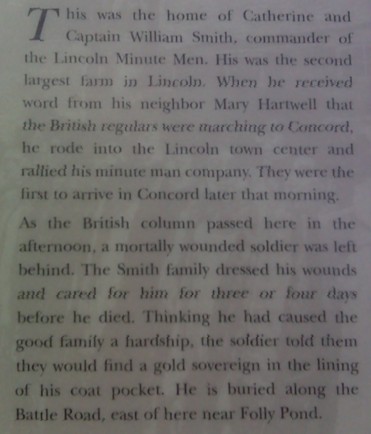
Memorial Day Tribute
Today, on an idyllic New England spring afternoon, walking the Battle Road where early on the morning of April 19, 1775 a conflict began that ended in the establishment of United States of America, you cannot help but be deeply moved.
On that day 234 years ago, a long column of British Regulars marches to Concord. Their orders: destroy muskets, powder, cannon, and other provisions that the rebels were stocking on Colonel James Barrett's farm.
The column approaches Lexington at dawn to find a militia formed up on the town green. They have no orders to engage. Their presence is an act of defiance--and a test by the leadership of a new nation.
The British Regular officers order the militiamen to lay down arms and disperse. Most disperse, but with their arms. A few who do not hear the order remain.
A shot is fired. Then more. When the smoke clears, two militiamen are dead and several are wounded.
The column of British Regulars continues its march to Concord.
The rest, as they say, is history.
Continuing on our walk, we reach the home of Catherine and Captain William Smith, pictured above. Below, the plaque that tells the story of the Smith’s efforts to assist an injured British Regular soldier, and what he did in return.
I took these photos with the camera in my cell phone. If you were transported back to that time, imagine trying to explain this to the Smith’s. Where would you begin? With the camera? The phone? The wireless network?
Impossible. Images captured? Displayed on tiny device, made of what? Out of oil, truth be told. Whale oil? No? Remember, we're talking to Captain William Smith.
Only God can do such things. We'd be arrested as heretics.
Yet the cell phone and the image of their home might be easier for them to accept than this: more than 200 years after the sacrifice of lives and livelihoods to bring forth a new nation founded on the principles of personal liberty and freedom, the government of that nation invaded foreign lands and tortured enemy combatants. They’d understand this instantly, that their sacrifices were at risk. The experiment in government of the people, by the people, and for the people had gone wrong. And I am just sure they’d be angry if they learned that we stood by and did nothing about it.

We’d like to thank the Lexington Historical Society and Minuteman National Park for preserving the Battle Road as a monument to those who were the first but not the last to die for an ideal.
Comment